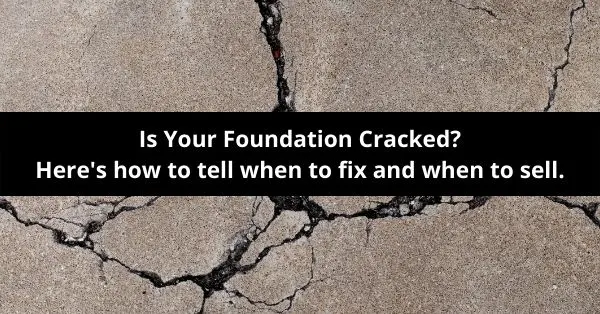
If you’ve found your home has a cracked foundation, you’re likely wondering how bad it is and how much it will cost to fix it. The good news is that not every crack needs fixed, the bad news is that some foundation cracks are indicators of more serious issues that are too expensive to repair. And that’s why we’ve created this post.
For almost two decades we have been buying houses with foundation issues, so we created this guide based on our experience to help you determine if it is worth fixing your cracked foundation, letting it sit for a while, or simply selling your house for cash because it is too late.
One important thing to remember is we are not there to personally look at the cracks in your foundation. If anything isn’t clear, contact a licensed contractor to come take a look.
Pro-tip: Make sure to read the reviews of your contractor online first because you don’t want someone that will always recommend service, especially when services aren’t needed.
Determining if the Cracked Foundation is Natural Wear and Tear
A cracked foundation can be caused by natural wear and tear to the home and may look bad, but not be an actual problem. However, in some cases the cracks in your foundation could be a sign that your home may not survive natural disasters like landslides, earthquakes or floods.
Foundational cracks from natural wear and tear occur most commonly when the soil underneath your home settles over time. The soil settling causes the foundation to sink in some areas while also pushing the foundation up in others. This force (also known as foundation heave) is what causes the natural cracks in your houses foundation.
Here are a few signs to tell if the cracked foundation is from these natural causes:
- There are cracks in the drywall around ceilings, windows and doors
- Doors or windows that stick when you try to open and close them
- Your chimney that leans
- The floors or crawl spaces are slopping
- Water is appearing in the basement or crawl spaces
Small cracks aren’t normally a cause for alarm, but they should be fixed. If these types of foundation cracks aren’t repaired they can let in moisture and lead to more serious foundation problems. Fixing small cracks can cost between $250 and $800.
Pro-tip: If the foundation crack is more than ⅛ inch wide, it should be checked out by a structural engineer or a foundation repair company to make sure your home is safe to live in.
Natural wear and tear is just one thing that can cause a foundation to crack. There are several other causes, and it is important to find out which exact problem caused the cracked foundation in order to determine whether or not you should fix your cracked foundation or sell your house.
Discovering the Cause or Causes of the Cracked Foundation
If your cracked foundation is not normal wear and tear, you’re going to have to do some detective work. The first thing to look for is the cause of the cracked foundation.
Causes of a cracked foundation include:
- Shifting of the land. This can cause sinkholes, earthquakes and landslides.
- Poor construction. If you have a new home and the builders did not prepare the land properly before laying the foundation, it can cause issues down the road.
- Damage from pests. Termites and carpenter ants can wreak havoc on the structural supports of your home, causing shifting and cracking in your foundation.
- Natural disasters like tornadoes, floods and hurricanes.
Unlike an easy natural wear and tear fix, major foundation repairs can easily cost $20,000 to $40,000 depending on the size of your home, the damage done, and building a new foundation that can withstand the items mentioned above. If this is the case and you still have a lot to pay on your mortgage, or you’re on a fixed income and this amount is not doable, you may want to sell to a “we buy houses” company and use the money to buy a new home without the damage.
The “we buy houses” company will be able to pay for the damage and sell for a profit whereas you would be stuck paying the bill and having to continue to pay your mortgage, property taxes, etc…
Figuring out if You Should Fix it or Sell Your House
Figuring out if you should fix a cracked foundation or sell your house instead is a big decision. There are several questions to ask yourself:
- What happens if the cracked foundation is from natural causes?
- Is it worth the time and cost of fixing your foundation if another serious storm can just come through and damage it again?
- If the cracked foundation is due to the sliding and shifting ground, will it happen again?
- If the sliding and shifting does happen again, will it lead to unrepairable damage that I cannot afford?
- Or is this a just one-time thing?
- If it was caused by an infestation that you cleared, the issue is gone and you may not have to worry. Therefore you should keep your house and not sell.
To help you make your decision, you need to know how serious your cracked foundation is.
How serious is your cracked foundation?
To help you determine how serious your cracked foundation is, look at what kind of crack you have:
- Horizontal cracks – these can be pretty serious and you may need a whole new foundation. This type of crack can be caused by unbalanced soil and water pressing against your foundation wall. You may notice the foundation bowing inwards and water leaking into your basement. If the problem isn’t fixed, you could have complete foundation failure. A major foundation repair can cost a lot of money, and selling the home could be a good choice in this situation.
- Hairline cracks – these occur in the mortar around bricks and concrete and are not usually a problem. The good news is these cracks are usually cosmetic and can be repaired by DIY homeowners.
- Stair-step cracks – these look like stair-steps in the mortar of the home. If these are larger than ¼ inch or the wall is bulging, they can pose a serious threat to the integrity of your foundation. Stair-step cracks can be caused by foundation settlement or sinking in one area and moisture related problems outside your foundation. Like the horizontal cracks, if the problem isn’t fixed, you could experience complete foundation failure. If the damage is extensive, you can sell your home and save yourself the cost and headache of dealing with a foundation repair project.
- L-shaped cracks – these usually happen when your foundation is on a downward slope. They should be filled to prevent further damage but are not a major concern.
The cost of repairs depends on how extensive the damage is.
Here are some estimated costs, which will change depending on the crack type and where you live.
- Fixing small foundation cracks can range from a few hundred dollars up to $2,000 to $3,000.
- Lifting a sinking foundation can range from $1,000 to $3,000 per support.
- What kind and how many supports need repaired will determine the total cost.
- Major repairs can range from $3,500 up to $10,000 or more, and can go as high as $20,000 to $30,000.
- A brand-new foundation can cost $40,000 depending on the work done, where you live and the size of your home.
Foundation cracks can be cause for concern, but not all are serious. Using the guide above you should be able to evaluate which types of foundation cracks you have and you can make a decision. if you’re concerned or think they are serious, call a licensed and reputable contractor to come give you an evaluation, or call us at and find out how much your house with a cracked foundation is worth.

